Index relies entirely on the support of donors and readers to do its work.
Help us keep amplifying censored voices today.
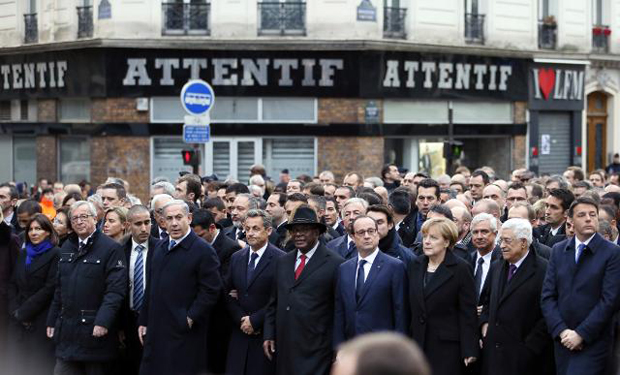
As we approach World Press Freedom Day, the right to freedom of expression will again be celebrated as an inalienable European value across the continent — by the public, the media and politicians alike. But to many, this will mean little more than engaging in a well trodden mental routine. We hardly consider the difficulties that freedom of expression faces in practice.
In the first part of 2015, more than a third of journalist killings in the word took place in two European countries; France and Ukraine. If it is true that Europe’s reactions to the Charlie Hebdo attack — the majority of them very emotional — were salubrious, they simultaneously gave rise to ambiguous situations. Many of the leaders that will on 3 May reaffirm their commitment free expression, supported the same message by taking part in the historic march in Paris on 11 January.
But upon seeing Angela Merkel, some were also reminded that Germany continues to treat blasphemy as a crime — as do Denmark, Spain, Poland and Greece, among others. Ireland, whose Enda Kenny was also in attendance, has a constitution which specifically mentions blasphemy and in 2010 enacted a new law against it. All these European countries defend themselves by saying that they do not apply their laws against “blasphemers”. That argument does not carry much weight when it comes to opposing those countries — Saudi Arabia, Iran, various Asian countries — that have tried to turn blasphemy into a universal crime recognised by the UN.
Spain’s Mariano Rajoy too marched in solidarity, but his government has taken steps to promote changes in the penal code that would “represent a serious threat to freedom of information, expression and the press”.
And what was Viktor Orban doing in Paris? The Hungarian president has reunified Hungary‘s public media so as to better bind them to his own party. Despite being the leader of an EU country, Orban has followed Vladimir Putin’s example. In this experimental model, the Andrei Sakharov Center and Museum is no longer ordered to close as it was in the old days, but rather fined 300,000 roubles (€5,000) for failing to register as a “foreign agent”. One day brings an announcement of compulsory registration for bloggers in Russia; another day, harassment against Russian and Hungarian NGOs perceived as “unpatriotic”.
Turkish Prime Minister Ahmet Davutohlu traveled to Paris, only to later label Charlie Hebdo’s post-attack issue a “provocation”. A reminder: Turkey is an EU candidate country where dozens of journalists have been sentenced to prison, and where various internet sites, including those that dared to reproduce some of Charlie Hebdo’s caricatures, have been blocked.
But also present at the march, were various representatives of European journalists — myself included. Just behind the Charlie Hebdo survivors, we carried a banner with the message “Nous sommes Charlie”.
Walking next to me was Franco Siddi, of the Italian National Press Federation. He talked to me about how imprisonment for defamation is still a possibility in Italy, though the European Court of Human Rights has ruled it a disproportionate punishment.
In my home country Spain too, this possibility of imprisonment remains, even if under Spanish jurisprudence freedom of expression consistently prevails over the demands of plaintiffs. In Italy, the situation is the same, yet my Italian colleagues point out that in 2014 alone, 462 journalists in the country were threatened with legal action for alleged acts of defamation. And while the current proposal for reform being considered foresees eliminating the possibility of jail time, it increases the potential fines.
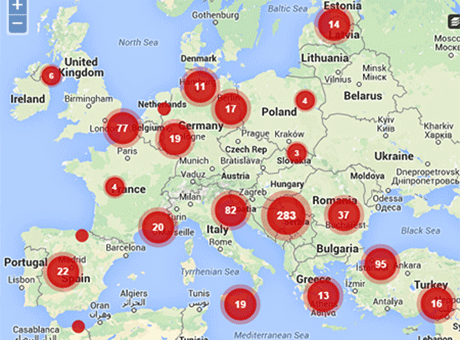
Index report: Europe’s journalists face growing climate of fear
This is not the only potential legal threat facing European journalists. Long before 9/11, there existed a reflexive habit of passing “urgent” laws under security pretexts, as in the UK during the most difficult years of the Northern Ireland conflict. The current model is the United States’ Patriot Act, which has recently been discussed in France. Meanwhile, in Britain and Spain are debating what free expression activists describe as “gag laws”. In Macedonia, the sentencing of the investigative journalist Tomislav Kezarovski to two years in prison under one of these security inspired laws stands out as a warning sign.
Against this worrying backdrop, across Europe journalists, freedom advocates, campaigners and even politicians are standing up for press freedom. When Gvozden Srecko Flego, member of the Parliamentary Assembly of the Council of Europe, recently highlighted the cases of Russia, Ukraine, Turkey and Azerbaijan as particularly problematic, he also suggested a countermeasure. He recommends “organising annual debates […], with the participation of journalists’ organisations and media outlets” in the respective parliaments of each state.
Media concentration, one of the most serious challenges to media pluralism and free expression in Europe, is being tackled. One proposal, which some international bodies have already accepted, would create a “Media Identity Card” requiring owners to publicly identify themselves and thus create an environment of more open and transparent media ownership.
When defending freedom of expression as a European value, we cannot allow ourselves to simply fall in into mental routines. This World Press Freedom Day we need both words and actions.
Paco Audije is a member of the Steering Committee of the European Federation of Journalists (EFJ)
World Press Freedom Day 2015
• Media freedom in Europe needs action more than words
• Dunja Mijatović: The good fight must continue
• Mass surveillance: Journalists confront the moment of hesitation
• The women challenging Bosnia’s divided media
• World Press Freedom Day: Call to protect freedom of expression
This column was posted on 1 May 2015 at indexoncensorship.org
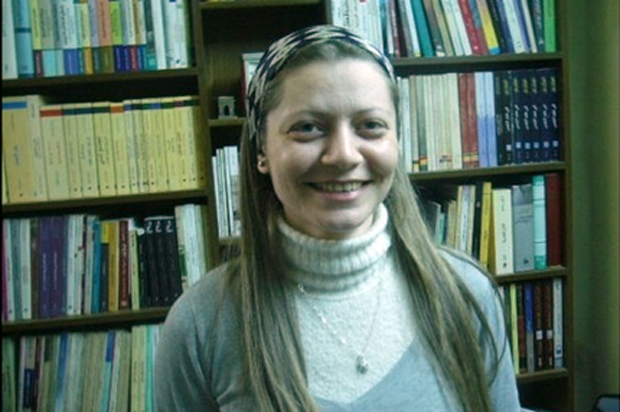
Razan Zaitouneh, above, Samira Khalil, Nazem Hamadi and Wa’el Hamada were abducted on 9 December 2013
To mark the 38th birthday (on April 29) of missing human rights defender and lawyer Razan Zaitouneh, head of the Violations Documentation Centre in Syria (VDC), winner of the 2011 Sakharov Prize for Freedom of Thought and the 2011 Anna Politkovskaya Award of RAW in WAR (Reach All Women In War), the undersigned human rights organizations today reiterate their call for her immediate release, as well as that of her missing colleagues Samira Khalil, Nazem Hamadi and Wa’el Hamada.
On December 9, 2013, the four human rights defenders, collectively known as the “Duma Four”, were abducted during a raid by a group of armed men on the offices of the VDC in Duma, near Damascus. There has been no news of their whereabouts or health since.
The VDC is active in monitoring and reporting on human rights violations in Syria and the undersigned organizations believe that the abduction of the four activists was a direct result of their peaceful human rights work. Their ongoing detention forms part of a wider pattern of threats and harassment by both government forces and non-state actors seeking to prevent human rights defenders exposing abuses.
In the months prior to her abduction Razan Zaitouneh wrote about threats she had been receiving and informed human rights activists outside Syria that they originated from local armed groups in Duma. The most powerful armed group operating in Duma at the time of the abductions is the Army of Islam headed by Zahran Alloush. In April 2014, Razan Zaitouneh’s family issued a statement saying they held Zahran Alloush responsible for her and her colleagues’ wellbeing given the large presence his group maintained in the area.
The undersigned organizations, as well as other activists, have been calling for the release of the “Duma Four” since their abductions. Today they again urge the Army of Islam and other armed groups operating in the area to take immediate steps to release the abducted VDC staff, or investigate their abduction and work for their release. They further urge governments that support these groups, as well as religious leaders and others who may have influence over them, to press for such action, in accordance with United Nations Security Council Resolution 2139, which “strongly condemns” the abduction of civilians and demands and immediate end to this practice.
Razan Zaitouneh has been one of the key lawyers defending political prisoners in Syria since 2001. She has played a key role in efforts to defend the universality of human rights and support independent groups and activists in Syria. Along with a number of other activists, she established the VDC and co-founded the Local Coordination Committees (LCCs), which co-ordinate the work of local committees in various cities and towns across Syria. She also established the Local Development and Small Projects Support Office, which assists non-governmental organizations in besieged Eastern Ghouta.
Samira Khalil has been a long-time political activist in Syria and had been detained on several occasions by the Syrian authorities as a result of her peaceful activism. Before her abduction, she was working to help women in Duma support themselves by initiating small income-generating projects. Wa’el Hamada, an active member of the VDC and co-founder of the LCC network had also been detained by the Syrian authorities. Before his abduction he was working, together with Nazim Hamadi, to provide humanitarian assistance to the residents of besieged Eastern Ghouta.
Signatories:
Alkarama Foundation
Amman Center for Human Rights Studies
Amnesty International
Arab Foundation for Development and Citizenship
Arab Network for Human Rights Information (ANHRI)
Arab Organization for Human Rights in Syria
Badael Foundation
Bahrain Centre for Human Right
Defending prisoners of conscience in Syria Organization
Cairo Center for Development (CCD)
Canadian Journalists for Free Expression (CJFE)
Centre for Democracy and Civil Rights in Syria
Committees for the Defending Democratic Freedoms and Human Rights in Syria
El-Nadeem Center for Rehabilitation of Victims of Violence
Enmaa Center for Democracy and Human Rights
Fraternity Center for Democracy and civil society
Front Line Defenders (FLDs)
Freedom House
Gulf Center for Human Rights
Human Rights Fist Society , Saudi Arabia
Human Rights Organization in Syria – MAF
Human Rights watch (HRW)
Humanist Institute for Co-operation with Developing Countries (HIVOS)
Hand in Hand Organization , Syria
Monitor for Human Rights in Saudi Arabia
Index on Censorship
International Media Support (IMS)
International Centre for Supporting Rights and Freedoms
International Civil Society Action Network (ICAN)
International Service For Human Rights (ISHR)
The Tunisian Initiative for Freedom of Expression
Institute for War and Peace Reporting (IWPR)
International Federation for Human Rights (FIDH) under the Observatory for the Protection of Human Rights Defenders
Iraqi Women Network
Iraqi Journalists Rights Defense Association(IJRDA)
Iraqi Network for social Media
Kurdish Committee for Human Rights in Syria (observer)
Kurdish Organization for Human Rights in Syria (DAD)
Kvinna till Kvinna Foundation
Lawyers for Lawyers
Lulua Center for Human Rights
Madad NGOs
Maharat Foundation
MENA Media Monitoring group
Metro Centre to Defend Journalists in Iraqi Kurdistan
National Organization for Human Rights in Syria
Nazra for Feminist Studies
No Peace Without Justice (NPWJ)
One World Foundation (OWF)
Omani Observatory for Human Rights
World Organization Against Torture (OMCT) under the Observatory for the Protection of Human Rights Defenders
Pax for Peace – Netherland
Pen International
Reach All Women in War (RAW)
Reporters Without Boarders (RSF)
Sentiel Human Rights Defenders
Syrian American Council (SAC)
Syrian Center for Media and Freedom of Expression (SCM)
Syrian Center for Legal Researches & Studies
Syrian Journalists Association
Syrian Network for Human Rights (SNHR)
Syrian League for Citizenship
Violations Documentation Center in Syria (VDC)
Yemeni organization for defending human rights and democratic freedom
In the mid-80s, advertising firm Saatchi and Saatchi made a short film for Index on Censorship. Starring Anthony Hopkins in the title role, The Censor, written by Ivan Kraus, depicted a dancer being ordered about by a commissar who repeatedly tells her what movements she is forbidden from making. When she finally comes to a standstill the censor demands of her: “Why aren’t you dancing? You call that a dance?”
In a pleasing irony, the film, intended as a cinema advert, never made it to screens as it was deemed “too political”.
I was reminded of this earlier in the week when I read about activist Maryam Namazie’s clash with Trinity College Dublin’s Society For International Affairs (SoFIA). Namazie claims that conditions were placed on her speaking at an event, in particular the imposition of a “moderator” in the form of Dr Andrew Pierce, an assistant professor in Ecumenics at TCD.
I don’t know Dr Pierce, or his work, so have no reason to doubt that he would be a perfectly fine moderator.
I do know Maryam Namazie, having moved in roughly the same atheist/secular/free speechy circles, and I’m not sure that she is very much into the idea of Ecumenics or being moderated.
Maryam Namazie is a refugee from the Islamic Republic of Iran. Her political education came in the Worker-communist Party of Iran, a group that does not spend a lot of time on “interfaith dialogue”. She retains a deep-seated anti-clericalism which has not so much gone missing from the British hard left, as never really existed (with the exception of libertarian communist/anarchist circles). She’s not into “interfaith”.
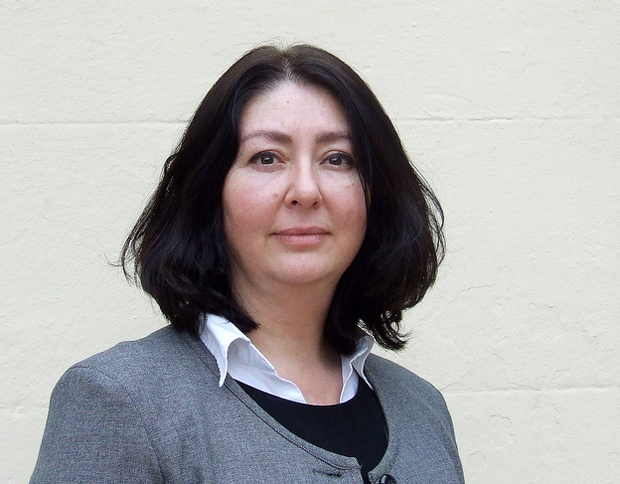
Maryam Namazie (Photo: Peter/Flickr/Creative Commons)
You can see why, as SoFIA speakers are normally not moderated, Namazie would not tolerate this exception. Like the dancer in the film, she felt so constrained by conditions that she could not continue. You can also see why SoFIA would imagine this as unreasonable, and cast it as so.
So has Maryam been prevented from speaking at TCD or not? Is this, as people like to ask “a free speech issue”?
The answers are: yes and no, and yes.
To the first question: yes and no. Yes, as she has been prevented from speaking under the terms she originally agreed to. Namazie clearly feels that the imposition of “moderation” will by its nature stifle her. And no, because, technically, the only person to actually prevent her from speaking was herself. It was she who pulled the plug.
Is this a “free speech issue”? Well yes. There are few more irritating arguments than “it’s not a free speech issue”.
This statement is usually backed up by the following arguments:
“X is against the law.” And? Resorting to the fact that something is illegal is to run away from an argument, not to win it. There are all sorts of bad laws, as anyone who has ever so much as signed a petition to change one has acknowledged. If you cannot form an argument as to whether someone should or should not do something without recourse to existing laws, you probably need to work a bit harder on it.
“Not compatible with Article 10 of the European Convention on Human Rights/Article 19 of the Universal Declaration of Human Rights.” See above. Legalistic arguments are for lawyers.
“This is an abuse of free speech”. Because you can only use your rights for the purposes I wish them to be used for. That’s how rights work.
“No one has a right to a platform.” This is absolutely true. However, the flip side of that is that clubs, societies etc have a right to invite the speakers and guests they choose. Every so often, the Oxford Union, or a university debating or philosophy society, will invite a fascist or a Holocaust revisionist to discuss “free speech” and its limits. It’s a dull trick, made even duller by the reaction of United Against Fascism/Socialist Workers Party student activists who will attempt to shut the talk down. (And, yes, before there are letters, you have every right to try to get something shut down. Yes, that is exercising your free speech, until you storm the hall. Then you’re using force).
“We’re not saying she can’t speak: just that she can’t speak here.” See above.
“You wouldn’t get away with that in X country (usually Saudi Arabia, Russia or China).” No, you wouldn’t. Why you want to compare the free world with regimes like that, I’ve no idea, but we should be glad that people “get away with” saying more in democracies than they do in autocracies.
“Free speech does not mean the ability to say X.” Nah, sorry. It definitely does.
And on it goes. The problem is that these caveats always apply to things that are, obviously so, free speech issues. But — and this is probably a good thing — nobody wants to be seen as against free speech (though it was amusing to see the format of the various censorious motions brought at the National Union of Students’ Women’s Conference this week: “Motion to Condemn XXXXphobia on campus. Speech for: NUS XXXX Society. Speech Against: Free”).
One wishes sometimes we could be more honest. Don’t say “this isn’t a free speech issue”, rather “this is a free speech issue, and I’m OK with this amount of censorship, for this reason.” Then we can talk.
This article was posted on 26 March 2015 at indexoncensorship.org
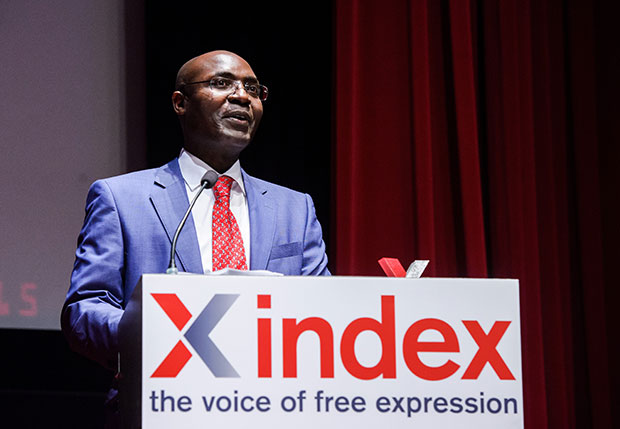
Journalist and human rights activist Rafael Marques de Morais (Photo: Alex Brenner for Index on Censorship)
Just days after being named the joint winner of the journalism award at the 15th Index on Censorship Freedom of Expression Awards, Angolan journalist Rafael Marques de Morais appeared in court for exposing corruption and human rights abuses.
Marques was confronted with up to 15 additional charges when he arrived in court on 24 March. The case was later adjourned until 23 April.
I went to court today facing nine charges of criminal defamation. I left slapped with up to 15 additional ones for defamation. Speechless!
— Rafael Marques (@RafaelMdeMorais) March 24, 2015
He also tweeted that a number of protesters outside the courthouse had been arrested.
There were so many police officers in and out of the court house protecting me(?) and the generals, but they arrested five protesters too.
— Rafael Marques (@RafaelMdeMorais) March 24, 2015
Marques’ leading investigative work into corruption and human rights abuses at Angola’s diamond companies was distilled into his 2011 book Blood Diamonds: Torture and Corruption in Angola. He recounted 500 cases of torture and 100 murders of villagers living near diamond mines, carried out by private security companies and military officials.
Marques declared the bosses of these groups morally responsible for the atrocities committed under them, and filed charges of crimes against humanity against seven Angolan generals. After his case was dropped by the prosecution, the generals launched a series of retaliation lawsuits in Angola and Portugal, charging Marques with criminal libel.
The suit demands a total of £800,ooo from Marques. He could face up to nine years in prison.
Index on Censorship calls for Angolan authorities to drop all charges against Rafael Marques de Morais and respect press freedom.
Index Awards 2015
• Rafael Marques de Morais: I believe in the power of solidarity
• Safa Al Ahmad: Facts are a precious commodity in Saudi Arabia
• Amran Abdundi: This award is for the marginalised women of northern Kenya
• El Haqed: I will fight for freedom, equality and human rights for ever
• Tamas Bodoky: The independence of journalism in Hungary is under threat
• Special Index Freedom of Expression Award given to persecuted Azerbaijani activists and journalists
• Video: Comedian Shappi Khorsandi hosts Index on Censorship awards
• Drawing pressure: Cartoonists react to threats to free speech
This article was posted on 23 March 2015 at indexoncensorship.org